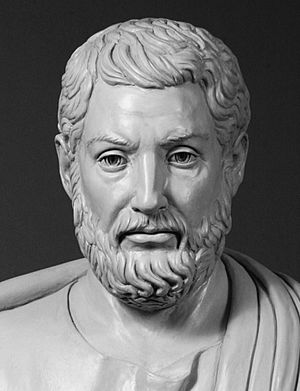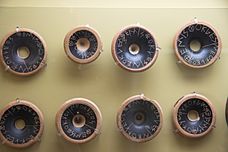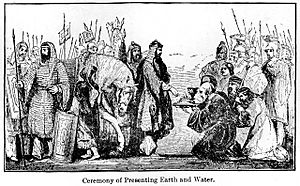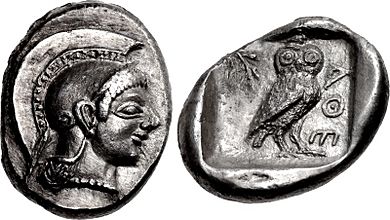Cleisthenes facts for kids
Quick facts for kids
Cleisthenes
|
|
|---|---|
| Κλεισθένης | |

Modern bust of Cleisthenes, known as "the father of Athenian democracy", on view at the Ohio Statehouse, Columbus, Ohio
|
|
| Eponymous archon of Athens | |
| In office 525 – 524 BC |
|
| Preceded by | Hippias |
| Succeeded by | Miltiades |
| Personal details | |
| Born | 570 BC |
| Died | 508 BC |
| Relations | Alcmaeonidae |
Cleisthenes (born around 570 BC, died around 508 BC) was an important leader in ancient Athens. He is famous for changing the rules of government in Athens. These changes helped make Athens a democracy in 508 BC. Because of his work, many historians call him "the father of Athenian democracy."
Cleisthenes was part of a powerful family called the Alcmaeonidae. He worked to give more power to the regular citizens of Athens. He also reduced the power of the rich noble families in politics.
In 510 BC, soldiers from Sparta helped the Athenians get rid of a ruler named Hippias. Hippias was a "tyrant," meaning he ruled with total power. After Hippias was gone, the Spartan king, Cleomenes I, tried to set up a government run by a few powerful people. This was called an "oligarchy." But Cleisthenes, with the help of ordinary citizens, took charge. Cleomenes tried to stop him, but Cleisthenes and his supporters won. Cleisthenes' changes gave all citizens equal rights. They also created a system called ostracism to remove powerful people who might threaten the democracy.
Contents
Life Story
Cleisthenes was born around 570 BC. He came from the powerful Alcmaeonidae family. His grandfather, also named Cleisthenes, was a tyrant in another city. But Cleisthenes of Athens believed in democratic ideas.
When Pisistratus became a tyrant in Athens, he sent his political rivals, including Cleisthenes' family, away from the city. After Pisistratus died in 527 BC, Cleisthenes came back to Athens. He became an "eponymous archon," which was a top official position.
Later, Pisistratus's sons, Hipparchus and Hippias, became tyrants. They again sent Cleisthenes away. In 514 BC, Hipparchus was killed. This made Hippias even stricter with the people of Athens. So, Cleisthenes asked the Oracle of Delphi (a famous ancient Greek prophecy site) for help. He wanted the Oracle to convince the Spartans to free Athens from tyranny. The Oracle agreed because Cleisthenes' family had helped rebuild the Oracle's temple before.
Becoming a Leader
With help from the Spartans and his family, the Alcmaeonidae, Cleisthenes helped overthrow Hippias. After Hippias was gone, Cleisthenes and another leader named Isagoras competed for power. Isagoras asked the Spartan king, Cleomenes I, to help him get rid of Cleisthenes. Cleisthenes was forced to leave Athens again.
Isagoras then tried to take away homes from many Athenians. He also tried to get rid of the Boule, which was a council of citizens that helped run the city. But the council and the people of Athens fought back. Isagoras and his supporters had to hide on the Acropolis (a fortified hill). After two days, they were forced to leave Athens.
Cleisthenes was then called back to Athens. He became the new leader. He quickly ordered a bronze statue to honor Harmodius and Aristogeiton, two men who had killed Hipparchus's brother.
How Cleisthenes Changed Athens
New Ways to Organize Politics
After becoming leader, Cleisthenes started to change how Athens was governed. He wanted to stop fights between powerful families. Before, Athens had four main tribes based on family connections. These tribes gave a lot of power to the upper class.
Cleisthenes changed this. He created ten new tribes based on where people lived, not their families. Each new tribe was made up of smaller areas called demes. There were about 139 demes in total. These demes were grouped into three regions: city, coast, and inland. This new system helped spread power more evenly among the people. It also made it harder for his political rivals to keep their power.
Cleisthenes also changed how people were named. Instead of using their father's name, Athenians started using the name of their deme. This helped people feel more connected to their local area and to Athens as a whole. These changes also helped include wealthy men who were not originally from Athens into Athenian society.
He also introduced a system called sortition. This meant that government jobs were chosen by random selection, like drawing names from a hat. This made sure that family connections or wealth didn't decide who got important roles. It's also thought that Cleisthenes made it possible for foreign residents to become citizens.
Cleisthenes also made the Boule (the citizens' council) bigger. It used to have 400 members, but he increased it to 500 members, with 50 from each new tribe. He also made them take an oath to "advise according to the laws what was best for the people." The court system was also reorganized. It had many jurors (from 201 to 5001) chosen each day, up to 500 from each tribe. The Boule would suggest new laws to the assembly of voters. The assembly would meet about 40 times a year to vote on these laws. They could approve, reject, or send laws back for changes.
Starting Ostracism

Cleisthenes also likely started the practice of ostracism. This was first used in 487 BC. If at least 6,000 citizens voted for it, a person could be sent away from Athens for ten years. The main idea was to remove anyone who seemed like they might try to become a tyrant. But later, it was used against anyone who became too powerful in the city. For example, Xanthippus was ostracized in 485–84 BC. When someone was ostracized, they kept their property, but they could not be in Athens where they might cause trouble. Some ancient writers even say Cleisthenes himself was the first person to be ostracized.
Cleisthenes called his reforms isonomia, which means "equal rights for all citizens." He did not call it demokratia (democracy) directly. We don't know much about Cleisthenes' life after he made these important changes.
Seeking Help from Persia

In 507 BC, while Cleisthenes was a leader in Athens, the city sent a group of ambassadors to Artaphernes. Artaphernes was the brother of Darius I, the Persian king. Athens was looking for Persian help to protect itself from threats from Sparta.
The ancient historian Herodotus wrote that Artaphernes didn't know who the Athenians were at first. He asked them for "Earth and Water," which was a symbol of giving up and becoming a subject of the Persian king. The Athenian ambassadors seemed to agree to this. Artaphernes also told the Athenians that they should take back their former tyrant, Hippias. The Persians threatened to attack Athens if they didn't accept Hippias.
However, the Athenians chose to stay democratic, even with the threat from the Persian Empire. When the ambassadors returned to Athens, their actions were rejected. The Persians might have seen the Athenians as subjects who had promised to obey them. So, later actions by Athens, like helping in the Ionian Revolt, might have been seen by Persia as breaking their promise and rebelling.
See also
 In Spanish: Clístenes de Atenas para niños
In Spanish: Clístenes de Atenas para niños
 | John T. Biggers |
 | Thomas Blackshear |
 | Mark Bradford |
 | Beverly Buchanan |


